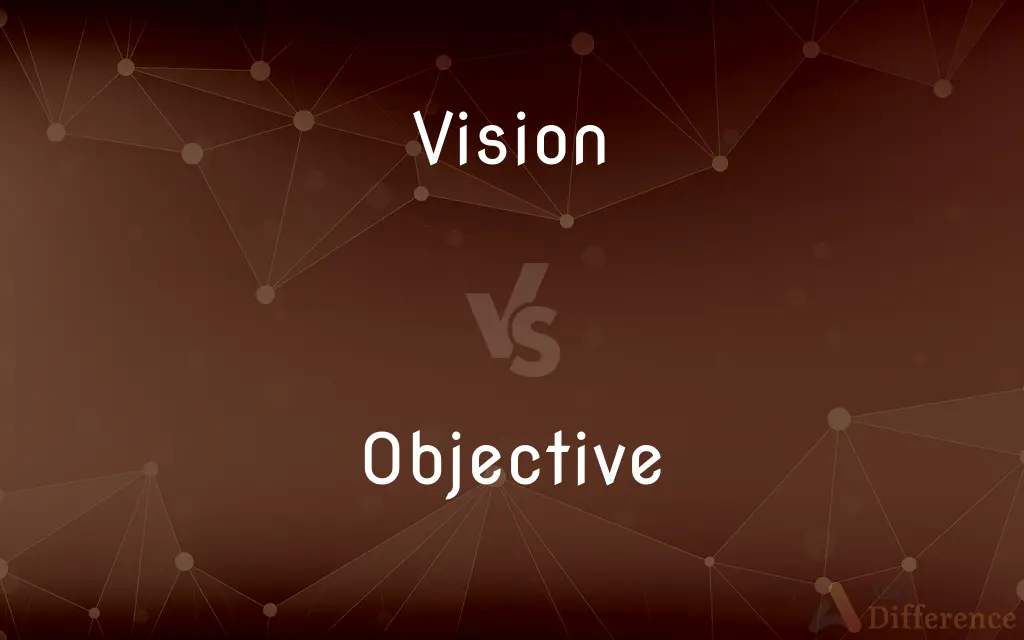Vision vs. Objective — What's the Difference?
Edited by Tayyaba Rehman — By Fiza Rafique — Updated on April 18, 2024
Vision defines a future state a company or individual aspires to, while objective is a specific, measurable step to achieve that vision.

Difference Between Vision and Objective
Table of Contents
ADVERTISEMENT
Key Differences
Vision is a broad, inspirational depiction of the future that an organization or individual aims to reach. It is aspirational, serving as a guide for growth and progress. Whereas, an objective is a concrete, measurable action that is designed to help achieve the broader vision. Objectives have specific timelines and are often quantifiable.
In strategic planning, a vision sets the direction and end goal, often motivating stakeholders and aligning efforts across an organization. Whereas objectives break down this vision into actionable steps that are necessary to move closer to achieving the envisioned future.
A vision is generally long-term, sometimes stretching over many years or even decades, encompassing the ideal scenario an entity hopes to realize. On the other hand, objectives are shorter-term, often set for months or a few years, and are regularly reviewed and updated as conditions change.
Visions are typically qualitative, capturing imaginations and stirring emotions to inspire action. They are intentionally designed to be broad to encompass a wide range of possibilities and innovations. Whereas objectives are quantitative, often focused on specific outcomes like revenue targets, market penetration rates, or operational efficiencies.
While a vision provides a destination, objectives are like the milestones or checkpoints along the journey. They offer a way to measure progress toward the ultimate vision, providing clear targets to strive for and assess performance against.
ADVERTISEMENT
Comparison Chart
Definition
Future state or aspiration of what one wants to achieve
Specific, measurable step towards achieving a vision
Time Frame
Long-term, often years or decades
Short-term, usually measurable in months or years
Nature
Qualitative and inspirational
Quantitative and specific
Function
Sets direction and motivates
Provides measurable steps and benchmarks
Measurement
Not directly measurable; more abstract
Directly measurable with specific indicators
Compare with Definitions
Vision
A conceptual ideal of what an organization or person wants to become.
Microsoft’s vision of a personal computer on every desk and in every home.
Objective
A specific result that a person or system aims to achieve within a time frame.
Increase quarterly sales by 15%.
Vision
A long-term, overarching goal that guides decision-making.
Tesla's vision to accelerate the world's transition to sustainable energy.
Objective
A measurable, concrete target set to advance towards a strategic goal.
Reduce operational costs by 10% within two years.
Vision
A future-oriented declaration of an organization's purpose and aspirations.
Google’s vision to organize the world's information and make it universally accessible and useful.
Objective
A short-term aim that helps fulfill a broader strategic purpose.
Launch three new products by the end of the fiscal year.
Vision
An inspirational framework within which strategies are developed.
Nike’s vision of bringing inspiration to every athlete in the world.
Objective
A strategic component that ensures alignment and accountability.
Achieve a customer satisfaction score of over 90%.
Vision
A broad, motivational aspect of strategic planning.
Amazon’s vision to be Earth’s most customer-centric company.
Objective
A defined, quantifiable goal to gauge progress.
Expand to two new international markets in 2024.
Vision
The faculty of sight; eyesight
Poor vision.
Objective
Existing independent of or external to the mind; actual or real
Objective reality.
Vision
Something that is or has been seen.
Objective
Based on observable phenomena; empirical
Objective facts.
Vision
Unusual competence in discernment or perception; intelligent foresight
A leader of vision.
Objective
Uninfluenced by emotions or personal prejudices
An objective critic.
Vision
The manner in which one sees or conceives of something.
Objective
A thing or group of things existing independent of the mind.
Vision
A mental image produced by the imagination.
Objective
The objective case.
Vision
The mystical experience of seeing something that is not in fact present to the eye or is supernatural.
Objective
A noun or pronoun in the objective case.
Vision
A person or thing of extraordinary beauty.
Objective
The primary optical element, such as a lens or mirror, in a microscope, camera, telescope, or other optical instrument, that first receives light rays from the object and forms the image. Also called object glass, objective lens, object lens.
Vision
To see in a vision.
Objective
Of or relating to a material object, actual existence or reality.
Vision
To picture in the mind; envision.
Objective
Not influenced by the emotions or prejudices.
Vision
(uncountable) The sense or ability of sight.
Objective
Based on observed facts; without subjective assessment.
Vision
(countable) Something seen; an object perceived visually.
Objective
(grammar) Of, or relating to a noun or pronoun used as the object of a verb.
Vision
(countable) Something imaginary one thinks one sees.
He tried drinking from the pool of water, but realized it was only a vision.
Objective
Of, or relating to verbal conjugation that indicates the object (patient) of an action. In linguistic descriptions of Tundra Nenets, among others.
Vision
Something unreal or imaginary; a creation of fancy.
Objective
A material object that physically exists.
Vision
(countable) An ideal or a goal toward which one aspires.
He worked tirelessly toward his vision of world peace.
Objective
A goal that is striven for.
Vision
(countable) A religious or mystical experience of a supernatural appearance.
He had a vision of the Virgin Mary.
Objective
(grammar) The objective case.
Vision
(countable) A person or thing of extraordinary beauty.
Objective
(grammar) a noun or pronoun in the objective case.
Vision
(uncountable) Pre-recorded film or tape; footage.
Objective
The lens or lenses of a camera, microscope, or other optical device closest to the object being examined.
Vision
(transitive) To imagine something as if it were to be true.
Objective
Of or pertaining to an object.
Vision
(transitive) To present as in a vision.
Objective
Of or pertaining to an object; contained in, or having the nature or position of, an object; outward; external; extrinsic; - an epithet applied to whatever is exterior to the mind, or which is simply an object of thought or feeling, as opposed to being related to thoughts of feelings, and opposed to subjective.
In the Middle Ages, subject meant substance, and has this sense in Descartes and Spinoza: sometimes, also, in Reid. Subjective is used by William of Occam to denote that which exists independent of mind; objective, what is formed by the mind. This shows what is meant by realitas objectiva in Descartes. Kant and Fichte have inverted the meanings. Subject, with them, is the mind which knows; object, that which is known; subjective, the varying conditions of the knowing mind; objective, that which is in the constant nature of the thing known.
Objective has come to mean that which has independent existence or authority, apart from our experience or thought. Thus, moral law is said to have objective authority, that is, authority belonging to itself, and not drawn from anything in our nature.
Vision
(transitive) To provide with a vision. en
Objective
Unbiased; unprejudiced; fair; uninfluenced by personal feelings or personal interests; considering only the facts of a situation unrelated to the observer; - of judgments, opinions, evaluations, conclusions, reasoning processes.
Objective means that which belongs to, or proceeds from, the object known, and not from the subject knowing, and thus denotes what is real, in opposition to that which is ideal - what exists in nature, in contrast to what exists merely in the thought of the individual.
Vision
The act of seeing external objects; actual sight.
Faith here is turned into vision there.
Objective
The objective case.
Vision
The faculty of seeing; sight; one of the five senses, by which colors and the physical qualities of external objects are appreciated as a result of the stimulating action of light on the sensitive retina, an expansion of the optic nerve.
Objective
The goal intended to be attained (and which is believed to be attainable);
The sole object of her trip was to see her children
Vision
That which is seen; an object of sight.
Objective
The lens or system of lenses nearest the object being viewed
Vision
Especially, that which is seen otherwise than by the ordinary sight, or the rational eye; a supernatural, prophetic, or imaginary sight; an apparition; a phantom; a specter; as, the visions of Isaiah.
The baseless fabric of this vision.
No dreams, but visions strange.
Objective
Undistorted by emotion or personal bias; based on observable phenomena;
An objective appraisal
Objective evidence
Vision
Hence, something unreal or imaginary; a creation of fancy.
Objective
Serving as or indicating the object of a verb or of certain prepositions and used for certain other purposes;
Objective case
Accusative endings
Vision
To see in a vision; to dream.
For them no visioned terrors daunt,Their nights no fancied specters haunt.
Objective
Emphasizing or expressing things as perceived without distortion of personal feelings or interpretation;
Objective art
Vision
A vivid mental image;
He had a vision of his own death
Objective
Belonging to immediate experience of actual things or events;
Concrete benefits
A concrete example
There is no objective evidence of anything of the kind
Vision
The ability to see; the faculty of vision
Vision
The perceptual experience of seeing;
The runners emerged from the trees into his clear vision
He had a visual sensation of intense light
Vision
The formation of a mental image of something that is not perceived as real and is not present to the senses;
Popular imagination created a world of demons
Imagination reveals what the world could be
Vision
A religious or mystical experience of a supernatural appearance;
He had a vision of the Virgin Mary
Common Curiosities
What is the difference between a vision and an objective?
A vision is an aspirational, qualitative statement of an ideal future state, while an objective is a concrete, measurable step that helps achieve that vision.
How often should objectives be updated?
Objectives should be reviewed and updated regularly, typically annually, to align with changing conditions and progress.
Can a company have multiple visions or objectives?
A company typically has one overarching vision and multiple objectives that change over time to support that vision.
Is it possible for objectives to change without altering the vision?
Yes, objectives may change as strategies and circumstances evolve, while the vision remains consistent as the long-term goal.
How do objectives contribute to achieving a vision?
Objectives provide specific, measurable milestones that progress an organization towards its broader vision.
Why is a vision important for an organization?
A vision is crucial as it provides a shared goal, inspires employees, and guides the overall strategy of an organization.
How are objectives prioritized within an organization?
Objectives are typically prioritized based on their impact, feasibility, and alignment with the strategic vision and current organizational needs.
What are some common characteristics of effective objectives?
Effective objectives are specific, measurable, achievable, relevant, and time-bound (SMART).
Can a vision change over time?
While visions are designed to be stable and long-term, they can evolve as the organization grows and external conditions change.
How can a vision influence customer perception?
A clear and compelling vision can enhance customer loyalty and trust by aligning company values with customer expectations.
Can personal goals be considered objectives?
Yes, personal goals are essentially objectives when they are defined with specificity and aligned with an individual's broader aspirations or vision.
Is it necessary for every employee to know the organization's vision?
Yes, knowing the organization’s vision helps employees understand their role in the larger context, enhancing engagement and productivity.
What role does leadership play in defining a vision?
Leadership is pivotal in defining a vision as leaders articulate and embody the vision, inspiring and motivating others to adopt and work towards it.
What happens when an objective is not met?
If an objective is not met, it is analyzed to understand the reasons for failure, and strategies are adjusted accordingly to better align with or achieve future objectives.
How do objectives help in performance evaluation?
Objectives provide clear metrics and targets against which individual and organizational performance can be measured and evaluated.
Share Your Discovery

Previous Comparison
Volume vs. Issue
Next Comparison
Trust vs. RespectAuthor Spotlight
Written by
Fiza RafiqueFiza Rafique is a skilled content writer at AskDifference.com, where she meticulously refines and enhances written pieces. Drawing from her vast editorial expertise, Fiza ensures clarity, accuracy, and precision in every article. Passionate about language, she continually seeks to elevate the quality of content for readers worldwide.
Edited by
Tayyaba RehmanTayyaba Rehman is a distinguished writer, currently serving as a primary contributor to askdifference.com. As a researcher in semantics and etymology, Tayyaba's passion for the complexity of languages and their distinctions has found a perfect home on the platform. Tayyaba delves into the intricacies of language, distinguishing between commonly confused words and phrases, thereby providing clarity for readers worldwide.














































